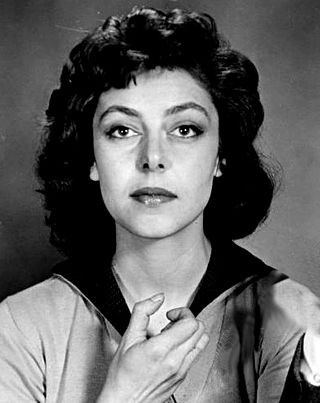
Nora Ephron was an American journalist, writer, and filmmaker. She is best known for writing and directing romantic comedy films and received numerous accolades including a British Academy Film Award as well as nominations for three Academy Awards, a Golden Globe Award, a Tony Award and three Writers Guild of America Awards.

Phyllis Ada Diller was an American stand-up comedian, actress, author, musician, and visual artist, best known for her eccentric stage persona, self-deprecating humor, wild hair and clothes, and exaggerated, cackling laugh.

Elaine Iva May is an American actress, comedian, writer, and director. She first gained fame in the 1950s for her improvisational comedy routines with Mike Nichols before transitioning her career, regularly breaking the mold as a writer and director of several critically acclaimed films. She has received numerous awards, including a BAFTA Award, a Grammy Award, and a Tony Award. She was honored with the National Medal of Arts from President Barack Obama in 2013, and an Honorary Academy Award in 2022.
Francis the Talking Mule is a fictional mule who first appeared in three short stories written for Esquire magazine by David Stern, which he later combined into the 1946 novel Francis. This was the basis of a series of seven Universal-International comedy films released from 1950 to 1956.
Naked refers to the state of nudity.

Josephine "Joan" Davis was an American comedic actress whose career spanned vaudeville, film, radio, and television. Remembered best for the 1950s television comedy I Married Joan, Davis had a successful earlier career as a screen actress, and a leading star of 1940s radio comedy.

Who Was That Lady? is a 1960 black and white American comedy film directed by George Sidney and starring Tony Curtis, Dean Martin, and Janet Leigh.
Sex comedy, erotic comedy or more broadly sexual comedy is a genre in which comedy is motivated by sexual situations and love affairs. Although "sex comedy" is primarily a description of dramatic forms such as theatre and film, literary works such as those of Ovid and Giovanni Boccaccio may be considered sex comedies.
Never Too Late may refer to:
A husband is a male participant in a marriage

The Star Boarder is a 1914 American short comedy film starring Charlie Chaplin. The film is also known as The Landlady's Pet, its 1918 American reissue title.
A widow is a woman whose husband has died; a widower is a man whose wife has died.

Misbehaving Husbands is a 1940 American comedy film directed by William Beaudine for Producers Releasing Corporation. The film had the working titles At Your Age and Dummy Husbands. Harry Langdon, Betty Blythe, Esther Muir, and others in the cast had been stars in silent films. It was Gig Young's film debut, under his real name Byron Barr.

Anthony E. Wills, sometimes given as Anthony E. Willis, was an American playwright, novelist, author of short stories, and theatrical producer. A native of Brooklyn, New York, Wills began his career as an author writing short stories. In 1901 his only novel, Monsieur Paul De Fere, was published by The Abbey Press. From 1902 until his death ten years later he devoted himself to writing plays; producing nearly forty works for the theatre. Several of his plays were performed by the Wills Amusement Company; a professional theatre troupe which Wills founded in 1907. The first play the organization performed was Wills' The Lost Trail which the company brought to Broadway in 1908. After his death in 1912 at the age of 32, Vitagraph Studios purchased the film rights to his entire body of work in 1913. That studio made three silent films based on stories by Wills: A Regiment of Two (1913), Our Wives (1913), and Too Many Husbands (1914).

Remodeling Her Husband is a 1920 American silent comedy film that marked the only time Lillian Gish directed a film.
Too Many Crooks is a 1959 British comedy film directed by Mario Zampi.
The Windsors is a British sitcom and parody of the British royal family, the House of Windsor. It was first broadcast on Channel 4 in April 2016 and stars Harry Enfield, Haydn Gwynne, Hugh Skinner, Louise Ford, Richard Goulding, Tom Durant-Pritchard, Kathryn Drysdale, Morgana Robinson, Ellie White, and Celeste Dring.
A matinée idol is a film or stage star greatly adored by their fans.








